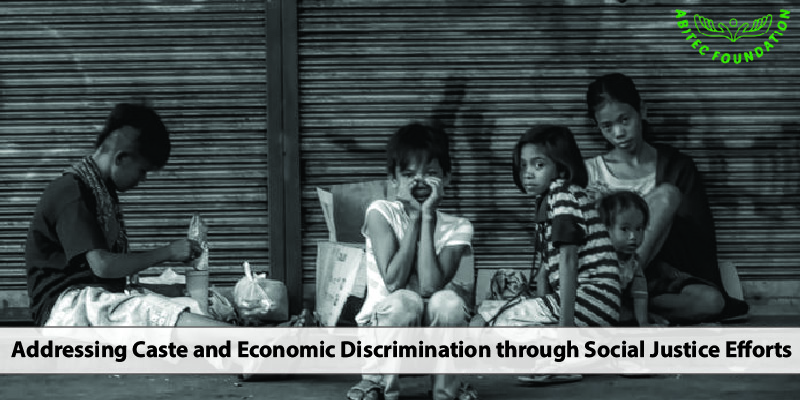Have you ever wondered why some social systems continue even when they clearly hold people back? This question may seem simple, but it shows how strongly society and tradition shape daily life. In India, where inequality still keeps many from education, healthcare, and opportunities, NGOs are stepping up. Through efforts against caste discrimination in India, they are helping communities find confidence, get support, and take control of their futures.
Understanding Discrimination and Inequality
Discrimination can show up in obvious ways or in ways that are harder to see, but it always has a big impact. Many communities face challenges because of their caste, gender, or economic background, stopping them from going to school, finding jobs, or having a voice in important decisions. These barriers don’t just hold back a person—they affect the progress of entire communities.
Many NGOs run social justice campaigns to challenge these barriers. By teaching people about their rights and encouraging open discussions, these groups help people recognise when they’re being treated unfairly and take action. The goal isn’t only awareness—it’s about shifting mindsets and behaviours.
Tackling Economic and Educational Gaps
Economic disadvantage often goes hand in hand with limited education. Many children fall behind in school because they can’t afford the basics, and families often stay trapped in poverty. NGOs provide the support they need to change that.
Children from financially struggling families often face barriers to getting an education. Addressing economic inequality, NGO can bring learning opportunities through free schools, mobile classrooms, and vocational programmes. These initiatives help children gain knowledge, practical skills, and the confidence to shape their own futures.
Check This Out: School Dropouts in India: What’s Causing It and How to Solve It
Protecting Rights and Fighting Exploitation
Often, discrimination goes together with people being denied their basic human rights. Labour exploitation, gender-based violence, and lack of legal protection are just some of the challenges faced by marginalised communities. NGOs step in with legal aid, counselling, and advocacy to ensure that these injustices do not continue unchecked.
Programs focused on child marriage, gender-based violence, and women’s empowerment show the impact of initiatives for social inclusion in India. Women who are educated, confident, and financially independent don’t just change their own lives—they also make a positive impact on their families and communities.
Health, Environment, and Sustainable Growth
The idea of social justice isn’t limited to schools or legal systems. Many rural areas still face serious healthcare challenges. Mobile clinics, telemedicine, and health awareness programmes ensure that treatment reaches those who might otherwise go without help.
Communities are discovering practical ways to care for the planet. From gentle farming methods to using renewable energy and keeping their surroundings clean, people are learning to work together. Combining fairness with caring for the planet helps communities gain confidence and handle challenges together.
How You Can Make a Difference
Supporting social justice can start with simple actions. Every little effort counts when it comes to advancing equality for disadvantaged groups. Here’s how to get involved:
- Volunteer your time with organisations working in education, healthcare, or women’s empowerment.
- Donate or contribute to support programmes that provide scholarships, legal aid, or vocational training.
- Start conversations about social issues in your community by sharing facts and information with others.
- Be part of movements that advocate for fairness, inclusion, and positive changes in policies.
- Join efforts that provide communities with the knowledge and support to create positive change in their lives.
Even small contributions matter. Every step helps communities grow stronger, empowers people, and brings long-lasting change for future generations.
Conclusion
Real change needs both effort and belief. When people learn new skills, gain confidence, and have the tools they need, they start taking control of their own lives. NGOs do a lot to help communities by providing things like schools, healthcare, legal advice, women’s leadership programmes, and projects that take care of the environment. By confronting caste discrimination in India, communities can become stronger, more equal, and filled with hope for the future.
Be part of Abitec Foundation’s work to create opportunities, promote equality, and empower communities. Let’s work together to make communities where everyone can reach their potential, whatever their background. Join us today!
Frequently Asked Questions
- Why do some social systems continue even when they hold people back?
Social systems are deeply shaped by tradition, culture, and human behavior, which can perpetuate inequality even when it limits opportunities.
- How do NGOs help tackle inequality in India?
NGOs promote community empowerment in India by providing education, healthcare, legal support, women’s leadership programmes, and sustainable initiatives.
- How can individuals contribute to social justice efforts?
Simple actions, such as volunteering, donating, sharing awareness, or supporting campaigns for fairness and inclusion, can help communities thrive.

